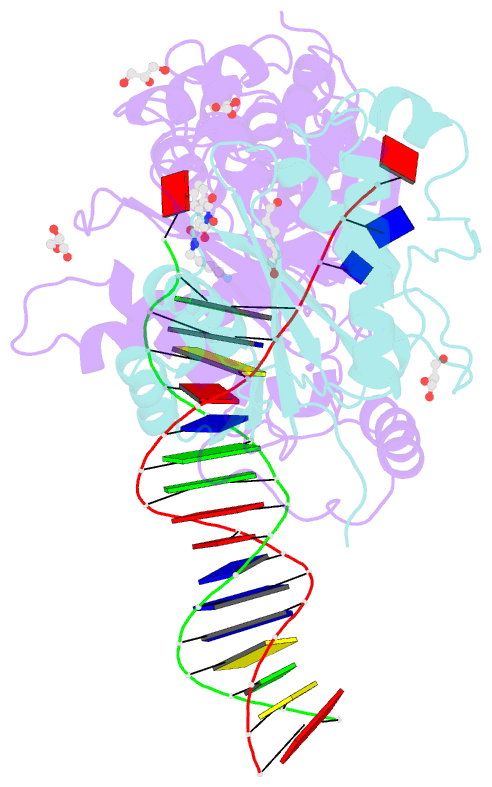Summary information and primary citation
- PDB-id
- 4ikf; SNAP-derived features in text and JSON formats;
DNAproDB
- Class
- viral protein-DNA-inhibitor
- Method
- X-ray (3.4 Å)
- Summary
- Pfv intasome with inhibitor mb-76
- Reference
- Desimmie BA, Demeulemeester J, Suchaud V, Taltynov O, Billamboz M, Lion C, Bailly F, Strelkov SV, Debyser Z, Cotelle P, Christ F (2013): "2-Hydroxyisoquinoline-1,3(2H,4H)-diones (HIDs), novel inhibitors of HIV integrase with a high barrier to resistance." Acs Chem.Biol., 8, 1187-1194. doi: 10.1021/cb4000426.
- Abstract
- Clinical HIV-1 integrase (IN) strand transfer inhibitors (INSTIs) potently inhibit viral replication with a dramatic drop in viral load. However, the emergence of resistance to these drugs underscores the need to develop next-generation IN catalytic site inhibitors with improved resistance profiles. Here, we present a novel candidate IN inhibitor, MB-76, a 2-hydroxyisoquinoline-1,3(2H,4H)-dione (HID) derivative. MB-76 potently blocks HIV integration and is active against a panel of wild-type as well as raltegravir-resistant HIV-1 variants. The lack of cross-resistance with other INSTIs and the absence of resistance selection in cell culture indicate the potential of HID derivatives compared to previous INSTIs. A crystal structure of MB-76 bound to the wild-type prototype foamy virus intasome reveals an overall binding mode similar to that of INSTIs. Its compact scaffold displays all three Mg(2+) chelating oxygen atoms from a single ring, ensuring that the only direct contacts with IN are the invariant P214 and Q215 residues of PFV IN (P145 and Q146 for HIV-1 IN, respectively), which may partially explain the difficulty of selecting replicating resistant variants. Moreover, the extended, dolutegravir-like linker connecting the MB-76 metal chelating core and p-fluorobenzyl group can provide additional flexibility in the perturbed active sites of raltegravir-resistant INs. The compound identified represents a potential candidate for further (pre)clinical development as next-generation HIV IN catalytic site inhibitor.





